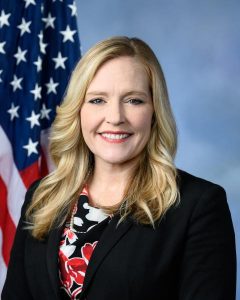
(Washington, D.C.) – Congresswoman Erin Houchin (IN-09) introduced the Data Broadband Reporting and Integration for Deployment in Geographically Essential Areas (Data BRIDGE) Act, a bipartisan bill to ensure rural and agricultural lands are accurately reflected on the FCC’s National Broadband Map.
By incorporating the USDA’s cultivated land data into the map, the bill will help direct federal broadband funding to the fields, pastures, and production areas that need it most.
“Indiana’s Ninth District is rich in agriculture, and our farmers depend on reliable broadband to stay competitive in a modern economy,” said Rep. Houchin. “The Data BRIDGE Act is a commonsense, low-cost solution that ensures federal broadband investments actually reach the areas where work happens. I have fought for years to expand rural broadband in Indiana, and this bill is another important step toward closing the connectivity gap for our farm families and rural communities.”
The FCC’s current broadband map primarily focuses on serviceable locations like homes and businesses but often misses the surrounding cropland and production acreage where farming takes place. This undercount skews funding decisions and limits the ability to deploy broadband needed for precision agriculture and other modern farming technologies. Precision agriculture relies on high-speed connectivity across entire farms to power modern tractors, planters, sensors, and irrigation systems that help farmers boost yields and farm more efficiently.
Support for the Data BRIDGE Act:
“American agriculture has become the envy of the world because we have embraced science, technology, and an appetite for innovation. I support the Data BRIDGE Act because this simple, no-cost fix will help support the rising demand for precision agriculture and ensure that rural and agricultural areas are accurately represented when it comes to federal broadband funding decisions,” said Rep. GT Thompson (R-PA), Chair of the House Agriculture Committee.
“If a D.C. bureaucrat misses a field on the broadband map, Iowa farmers pay the price,” said Rep. Zach Nunn (R-IA). “The Data BRIDGE Act is a no-cost, commonsense fix that makes sure agricultural land data isn’t overlooked. By putting real data into the FCC’s system, we are making broadband maps work for the whole farm, so federal dollars don’t stop at the porch, they reach the tractor in the field.”
“Everyone deserves to have broadband access — no matter where they live,” said Rep. Robin Kelly (D-IL). “My district includes 4,500 farms — a vast majority of them family-owned — and they need internet and connectivity for better operations across their land. By improving the National Broadband Map to include accurate agricultural areas, we can successfully close gaps in broadband issues.”
“Access to fast and reliable internet isn’t a luxury – it’s a necessity for Americans across the country to stay competitive in our fast-moving world,” said Rep. Eric Sorensen (D-IL). “For too long, farmers and rural communities have been left out of the race to connect our country with high-speed internet despite its importance to modern farming practices. The USDA and the FCC already have the tools at their disposal to ensure no one is overlooked, so now is the time for them to join forces by integrating cultivated land data into the National Broadband Map to bring more communities online.”
“Broadband access is becoming increasingly crucial for agriculture producers as applications for greater productivity and resource management multiply. As chairman of the recently formed Modern Agriculture Caucus, I am glad to work with Rep. Houchin, who serves the caucus as Vice Chair of Precision Agriculture, to promote accurate representation on the FCC’s National Broadband Map for farmers and ranchers in underserved areas through this bill,” said Rep. Adrian Smith (R-NE).
“I am proud to support this bipartisan effort to ensure rural communities are accurately represented in broadband maps, including areas in my district such as East Orange and South Osceola Counties. With funds from the American Rescue Plan and Infrastructure Law, we’ve worked to expand broadband access and bring high-speed internet. Now, as we work to further bridge the digital divide, this will help us accurately target federal funds to help those who need it most,” said Rep. Darren Soto (D-FL).
“Too many farms and rural areas are left off the map, and that means they’re left out of critical broadband funding. This bill changes that at no cost, so we can bring reliable internet to the communities that feed America,” said Rep. Jim Costa (D-CA).
“Precision broadband-based agriculture is critical for today’s farmers to thrive in a competitive economy. Reliable point-level broadband data is essential for economic development in rural areas and farmlands. The Data BRIDGE Act promotes strategic, targeted, and data-based investments in rural areas to ensure broadband is readily available to our nation’s farmers who are navigating an everchanging agricultural landscape,” said CostQuest.
“Equipment manufacturers applaud Representatives Houchin, Kelly, Nunn, Sorensen, and Costa for introducing critical legislation to improve broadband mapping in agricultural communities,” said Kip Eideberg, AEM senior vice president of government and industry relations. “America’s farmers face a significant broadband access gap, particularly for speeds needed for precision agriculture and modern operations. With greater access to dependable broadband, the latest precision agriculture technology will ensure that farmers can continue to feed the world while conserving natural resources. AEM is proud to support this commonsense, bipartisan effort to close the digital divide and strengthen America’s farm economy.”
The Data BRIDGE Act builds on the bipartisan Broadband DATA Act, which improved broadband mapping standards but did not specifically address agricultural coverage. The USDA already collects cultivated land data, and the bill simply directs the FCC to integrate it into existing maps — with no new cost, no new mandates, and significant benefits for rural America.
(Office of Congresswoman Erin Houchin press release)



